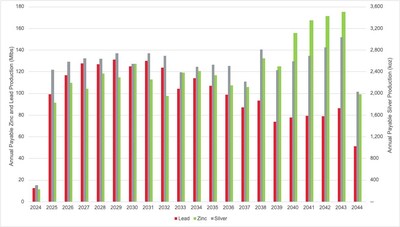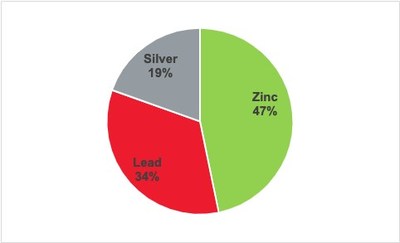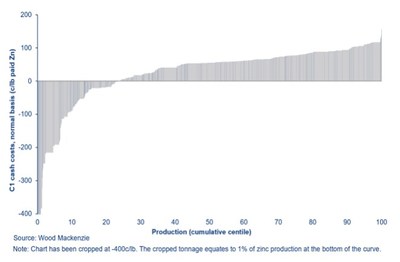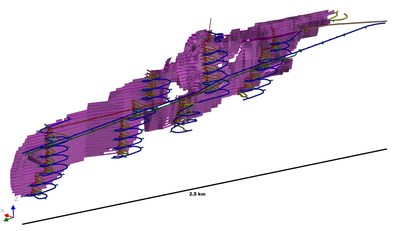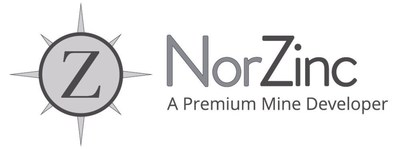NorZinc Announces Positive PEA Including After-Tax NPV8% Of US$299M on Extended 20-Year Mine Life at Higher 2400 tpd Throughput
NZC-TSX
NORZF-OTCQB
(All figures are presented in US Dollars unless otherwise stated)
VANCOUVER, BC, Oct. 21, 2021 /CNW/ - NorZinc Ltd. (TSX: NZC) (OTCQB: NORZF) (the "Company" or "NorZinc") is pleased to announce the results of a Preliminary Economic Assessment ("PEA") for its 100%-owned Prairie Creek Project ("Prairie Creek" or the "Project") in the Northwest Territories, Canada. The PEA incorporates an updated Mineral Resource Estimate providing an economic assessment for a 2,400 tonnes per day ("tpd") mine plan with a life of mine of 20.3 years.
PEA Highlights Include:
- After-tax NPV8% of $299 million using base case metal prices of $1.20/lb zinc, $1.05/lb lead and $24/oz silver (pre-tax NPV8% of $505 million)
- After-tax IRR of 17.7% (pre-tax IRR of 21.4%) based on initial Capex of $368 million, including $35 million of contingency, with significant opportunity to improve initial costs through cost optimization
- At recent zinc spot price of approximately $1.50/lb zinc, after-tax NPV8% increases to US$479 and IRR increases to 22.8%,
- LOM C1 by-product costs of $0.19/lb Zn and C3 by-product costs of $0.60/lb Zn (C1 co-product costs of $0.73/lb ZnEqi and C3 co-product costs of $0.92/lb ZnEq), placing Prairie Creek in the lowest third of zinc mines once in operation
- Average annual payable ZnEq production of 261 Mlbs, including 2.6 Moz of average annual silver production, over a 20-year life of mine, with a payback of 4.8 years
- Total cumulative LOM EBITDA of $2.5 billion; average annual EBITDA of $123 million
- Updated Mineral Resource Estimate includes 9.8 M tonnes of total Measured & Indicated ("M&I") Resources at 22.7% ZnEq, a 15% increase in total M&I tonnage from the September 2015 Mineral Resource Estimate and 6.4 M tonnes of total Inferred Resources at 24.1% ZnEq
- Updated definitive Feasibility Study to commence immediately and will incorporate the investigation of numerous identified opportunities to add value by optimizing capex and opex input costs
- Project represents a majorly de-risked project with world-class potential in one of the most favourable and stable jurisdictions in the world
"The completion of the PEA is yet another significant milestone for NorZinc as it showcases the true potential of the Prairie Creek deposit, demonstrating a robust throughput rate of 2,400 tpd over a long mine life of over 20 years, highlighting the potential value and benefit this project has to deliver to all stakeholders," commented Rohan Hazelton, CEO of NorZinc Ltd. "While the PEA considers historical data with a reinterpreted mineral resource, it outlines a solid base-case for management as we continue on the planned path towards financing and development of the Prairie Creek Project. The modified permits for the expanded throughput rates are well underway with approvals expected in late Q1 2022."
"We have identified multiple opportunities for further operational and economic optimization, which we will continue to investigate as we move towards the next step of completing an updated Feasibility Study for the Project, particularly in relation to input costs relating to both the initial and sustaining capital and operating costs as well as the ore sorting strategies aimed at optimizing processing. The fundamentals for zinc, our primary product, are strong and are enhanced by the recent addition of zinc to Canada's Critical Mineral List which highlights the minerals critical to the building of a clean and digitized economy. Silver is also expected to continue to play a significant role in the development and financing of the project as the market demand for silver streams is high."
"Overall, this PEA demonstrates compelling economics which provides management with greater conviction in early-stage financing discussions already taking place. And while metallurgy continues to be a consideration, management is confident in the quality and marketability of our concentrate. We have strong interest and demand for our concentrates as recently reaffirmed with our MOU with Boliden."
Table 1: Highlighted Results from PEA
After-Tax Net Present Value ("NPV") (Discount Rate 8%) | $299M |
After-Tax Internal Rate of Return ("IRR") | 17.7% |
After-Tax Payback Period | 4.8 Years |
Pre-Production Capex | $368M |
Sustaining Capex and Closure Costs | $332M |
Average Annual Payable Silver | 2,551 koz |
Average Annual Payable Zinc | 122 Mlbs |
Average Annual Payable Lead | 101 Mlbs |
Life of Mine ("LOM") | 20.3 Years |
Total Resource Mined | 17.2 Mt |
Average ZnEq[i] Diluted Grade of Mineral Resources Mined | 17.10% |
Gross Revenue After Royalty (LOM) | $6,274M |
After-Tax Free Cash Flow (LOM) | $1,121M |
Average Annual EBITDA | $123M |
C1 Costs over LOM (By-Product) | $0.19/lb Zn |
C3 Costs over LOM (By-Product) | $0.60/lb Zn |
C1 Costs over LOM (Co-Product) | $0.73/lb ZnEq |
C3 Costs over LOM (Co-Product) | $0.92/lb ZnEq |
Zinc Price - Flat (LOM) | $1.20/lb |
Lead Price - Flat (LOM) | $1.05/lb |
Silver Price - Flat (LOM) | $24.00/oz |
FX Rate (CAD:USD) | 1.25 |
The PEA was prepared in accordance with National Instrument 43-101 Standards of Disclosure for Mineral Projects ("NI 43-101") and led by Ausenco, with contributions from Global Mineral Resource Services, Mining Plus and F. Wright Consulting.
The reader is advised that the PEA summarized in this press release is preliminary in nature and is intended to provide an initial, high-level review of the project's economic potential and design options. The PEA replaces and supersedes the Company's previous 2017 Feasibility Study on the project. The PEA mine plan and economic model includes numerous assumptions and the use of Inferred Resources. Inferred Resources are considered to be too speculative geologically to have economic considerations applied to them that would enable them to be categorized as mineral reserves, and there is no certainty that the PEA will be realized. Mineral Resources that are not mineral reserves do not have demonstrated economic viability.
Table 2: Capital Costs Summary
Capital Cost Summary | Pre-Production (US$M) |
Mining | $51 |
Site Preparation | $1 |
Process plant1 | $41 |
Paste Tailings Plant | $28 |
Surface Infrastructure2 | $41 |
All Season Road (ASR) | $89 |
Total Direct Costs | $251 |
Site Indirects3 (including EPCM) | $39 |
Owner's costs - Operational Readiness & Fuel | $25 |
Owner's costs - Capitalized Pre-production | $18 |
Total Directs, Indirects and Owner's costs | $333 |
Contingency | $35 |
Total Pre-Production (Initial) Capital | $368 |
Notes to table: | |
1. | Includes dense media separator, mill building remediation, process plant upgrade |
2. | Includes site utilities, process plant mobile equipment, ancillary buildings, water treatment plant, water storage pond, waste rock pile, winter road maintenance and management, underground infrastructure |
3. | Includes construction indirects, spares and initial fills, freight and logistics, commissioning and startup, EPCM, vendor assistance |
Table 3: Operating Costs Summary
Operating Cost Summary | US$/t Milled |
Mining | $53.97 |
Processing Costs | $26.64 |
Surface Support Costs | $17.55 |
G&A Costs | $12.12 |
Sub-Total | $110.28 |
Transport Costs | $57.22 |
Total | $167.50 |
The relative economic attractiveness of a project is an important aspect. Those mine projects which have a lower cost structure should typically be the first projects to fill the supply gap. This is best illustrated by the Normal (By-product) C1 Cash Cost Curve from Wood Mackenzie shown below forecasted for 2027. This evaluation considers the cash operating costs and accounts for the by-product credits and includes all mines which are forecast to be operating in 2027 when Prairie Creek is planned to have been operating for several years. According to the estimated C1 by-product costs of $0.19/lb Zn in this PEA, this would place Prairie Creek in the lowest third of all projected mine operating costs in that year. Thus, with its low operating cost structure and advanced project status Prairie Creek is well positioned to fill the requirement for zinc mine supply.
Opportunities to Enhance Value
Ore sorting test work with designated ore sorting equipment vendors will be conducted to evaluate amenability of the ore sorting process option for the Prairie Creek Project. Upon conclusion of testwork, a trade off study will be performed to evaluate use of ore sorting as a preferred pre-concentration method.
Based on the ore sorting test work conducted on similar lead/zinc deposits there is a possibility that ore sorting will add value to the project by:
- Reducing operating cost in the pre-concentration circuit (eliminates the need for the reagents)
- Decreasing capital and operating expenditure in the milling circuit by rejecting more waste material upfront
- Increase the head grade of material going into the mill.
In the next phase of the project, potential capital cost expenditure savings could be achieved by:
- Looking into option of purchasing available equipment from OEM's cancelled orders
- Identifying the vendor that can supply all (or majority) of the major equipment and bundle up the orders to receive a discounted pricing.
Exploration Potential
The Main Quartz Vein (MQV) remains a significant exploration target open to the north and appears to be continuous throughout the Inferred Resources and with mineralization observed in the Main Zone. The Stockwork (STK) and Stratabound Massive Sulphides (SMS) mineralization styles are also underexplored and may harbour additional opportunities as secondary exploration targets alongside the typically higher-grade and adjacent MQV targets.
From 2010 to 2012, the Company conducted a deep-hole drill program of 1,800m along strike past the northernmost edge of the Inferred MQV resource and intercepted 3.5m of MQV-style mineralization (refer to Company press release dated Nov 22, 2012). Coupled with the 800m strike length of the existing Inferred MQV resource, an extensive MQV exploration target horizon remains and will continue to be a focus for future exploration programs.
MQV-style mineralization has also been identified in Zones 5 through 12, extending approximately 10km to the south of the Prairie Creek Mine Site. Previous owners held a modest historical resource in Zones 7 & 8, before returning to the higher-grade Main Zone, and has since received only intermittent exploration. The Company also owns the Gate Leases, a set of mining leases to the west of the mine site which have identified zinc soil anomalies, and MQV-style mineralization in outcrop.
Sensitivity
The Project is expected to be a robust operation and profitable at a variety of prices and assumptions. Metal prices used in the study are based on long-term forecasted estimates. At US$1.20/lb zinc, $1.05/lb lead and $24/oz silver, the Project generates an NPV of $299M and an IRR of 17.7% on an after-tax basis.
- At recent spot pricing for zinc of $1.50lb, the Project maintains an NPV of $479M and IRR of 22.8% on an after-tax basis.
Table 4: Sensitivity Analysis for commodity price and foreign exchange
Commodity Price | -10% | Base Case | +10% |
Pre-Tax NPV ($M) | 254 | 505 | 757 |
Pre-Tax IRR % | 15.1% | 21.4% | 27.2% |
Post-Tax NPV ($M) | 132 | 299 | 461 |
Post-Tax IRR % | 12.5% | 17.7% | 22.5% |
Foreign Exchange | -10% | Base Case | +10% |
Pre-Tax NPV ($M) | 329 | 505 | 650 |
Pre-Tax IRR % | 16.2% | 21.4% | 26.3% |
Post-Tax NPV ($M) | 178 | 299 | 395 |
Post-Tax IRR % | 13.4% | 17.7% | 21.8% |
Mining
The Prairie Creek project will be accessed via existing adits in the hillside. The existing adits are to be enlarged to a larger cross-sectional size to make optimal use of existing infrastructure.
An updated geological block model for the Prairie Creek project was processed utilising Deswik© Mineable Shape Optimizer (MSO) software to identify the economically mineable shapes for the project. The result is a preliminary mining inventory of 17.2 Mt for the operation, inclusive of inferred material.
The Prairie Creek orebody has three distinct zones, the MQV, SMS and the STK zones. Based on the geometry of the mining zones a Longitudinal Retreat Longhole Open Stoping (LHOS) method was selected for the MQV and the STK. In the SMS, however, Longitudinal Retreat Uppers Stoping (LRUS) was selected due to the zone's geometry. Both mining methods lend themselves to comparatively low cost, bulk mining that suits the geometry and type of deposit.
The project will produce 2,400 tpd of diluted ore from the underground workings. A diesel powered, mechanized mining fleet is currently planned. The operation is also planning to utilize 100% of flotation tailings for backfill purposes. Ventilation for the underground workings will be drawn into the portal adits, flow through the workings and exit the mine via dedicated ventilation shafts. Mine air will be heated as required at the adit portal due to the low temperatures in the region. Secondary egress for workers will utilise ladderways in dedicated escape shafts in the event that primary egress is obstructed.
Metallurgy and Processing
The Prairie Creek process plant will be able to process 2,400 tpd of run-of mine ("ROM") ore. The first stages of the processing plant are a two-stage crushing circuit, followed by a dense media separation ("DMS") plant, which will typically reject 25% low density material. The DMS plant high-density (sink) fraction and crusher fines, which bypass the DMS plant, will be recombined to feed a grinding circuit to prepare the material for flotation. Flotation will consist of a conventional lead flotation circuit with a rougher, concentrate regrind and three stages of cleaning, followed by zinc flotation with a rougher and three stages of cleaning. On average, the plant will produce 221 tpd of lead concentrate containing 60% lead and 1090 g/t silver and, 310 tpd of zinc concentrate containing 58% zinc.
Concentrates will be dewatered, containerized and trucked from the mine to a transfer station such as Fort St. John, or other alternatives, where the containers will be loaded onto rail cars for distributions to market. DMS plant waste rock will be loaded onto trucks for transfer to the on-site waste rock pile. Flotation tails will be filtered and placed underground as paste backfill.
A summary of the process plant grades and recoveries is shown in the table below.
Table 5: Processing Overview
Description | Unit | Value |
Annual Throughput (Nominal) | tpa | 876,000 |
ROM Head Grades Pb (LOM Average) | % total / sulphide | 6.58 / 5.78 |
ROM Head Grades Zn (LOM Average) | % total / sulphide | 9.00 / 8.58 |
ROM Head Grades Ag (Average) | g/t | 119 |
Lead Concentrate - Lead Recovery | % | 86.5 |
Lead Concentrate - Silver Recovery | % | 86.8 |
Zinc Concentrate - Zinc Recovery | % | 85.7 |
Zinc Concentrate - Silver Recovery | % | 7.8 |
Smelting and Concentrate Quality
Discussions have been ongoing with potential buyers of the concentrate and the Project is well known in the marketplace. A non-binding Memorandum of Understanding ("MOU") has been signed with Boliden which extends the validity of the existing MOU to June 30, 2023 from its original expiry date of June 30, 2022 and significantly increases zinc sulphide concentrates to be delivered to Boliden, with exact annual quantities to be mutually agreed.
Along with the formal MOU process negotiations have been proceeding with several other buyers of the concentrates. As such, formal offers have been received by NorZinc which exceed the total forecast production of the mine. These negotiations will continue and are expected to proceed to formal agreements as the development of the mine progresses.
Proposed Infrastructure Upgrades and Access Road
The Prairie Creek Project is a remote, isolated site, with existing site infrastructure that requires upgrade, expansion or replacement where necessary.
In 1982, the mine was fully permitted, and construction was almost complete, but production was not achieved. The existing site infrastructure includes the process plant, administration building, workshops, sewage treatment plant, diesel storage tank farm and warehouses. New facilities needed for operations will include the DMS plant, a paste backfill plant, tailings stockpiles, liquified natural gas ("LNG") facility, water storage pond, waste rock pile, water treatment plant, accommodations and kitchen, additional warehouse and concentrate load-out facility.
New dual-fuel powered low-speed power generator units will provide power and heat for the site. These power generator units will be located within the existing mill powerhouse after removal of the obsolete units currently in place. The energy source for the power generation will be provided by a combination of LNG using an on-site LNG storage / vaporization facility and diesel fuel from the existing diesel storage tank farm adjacent to the mill. The new generators will be outfitted with glycol heat recovery systems in order to maximize energy efficiency. The heat from the generators will be used to heat some of the surface facilities.
An active stockpile of tailings will be stored in a building with heating capability next to the paste backfill plant to provide feed to the plant. An outdoor area will accommodate a secondary tailings stockpile. The waste rock pile will be located in a draw of the Harrison Creek valley north of the mill and accessed by trucks on a reconstructed internal site road.
A 150-person camp and cookhouse exists on the site, but most of the buildings have deteriorated beyond economical repair. They will be demolished and replaced by a modular camp adjacent to the upgraded administration building complex to be used during construction and operations.
The site water management plan includes the reconfiguration of an existing large pond originally intended for tailings into a two-celled water storage pond connected to the mine and mill via piping and to a new water treatment plant. An exfiltration trench below the bed of Prairie Creek will discharge site effluent.
The site is serviced by a 3,000 ft gravel airstrip located approximately 1 km from the camp beside Prairie Creek which can accommodate passenger aircraft up to DHC-7 size.
The construction of the process plant and site infrastructure will be initially serviced via a winter road. Site production operations will be supported via an all-season road ("ASR") which will be completed prior to concentrate production.
Water Management
Water management plans have been improved since the 2013 operating permits were issued. The expected range of groundwater that would be flowing into the mine has been reduced, and it has been determined that the majority can be intercepted by drainage wells, thus avoiding contact and contamination in the mine workings. Separately, the mill process flow sheet has been improved and processing can occur with 100% recycling of mill effluent. These two improvements will result in a better effluent for discharge, consisting almost entirely of the intercepted groundwater, and with a reduced demand for water treatment. The water storage pond will have one cell to enable recycle of water to the mill, and another for the temporary storage of the intercepted groundwater prior to discharge, with and without treatment to meet effluent water quality limits.
Operating Permits
Mine operating permits were received from the Mackenzie Valley Land and Water Board ("MVLWB") in 2013. These were renewed in 2020. In 2021, the Company applied to make some modifications to the permits to reflect an expanded project. The permitting process has reached the mid-point and is expected to conclude in late Q1 2022.
Closure Plans and Costs
The main components of closure plans are the removal of infrastructure and buildings, removal of the water storage pond and covering of the waste rock pile. The value of mine closure costs associated with the 2020 operating permits, and estimated using the Government of the NWT's cost calculator, total $14.2M. A small increase in these costs is expected to reflect the closure costs for the expanded project in the permits expected to be issued in 2022. ASR closure costs are estimated at $6.4M.
Stakeholder Engagement
The Company continues to work in partnership with the local Indigenous and non-Indigenous Governments of the region that would be impacted by the Project and are the key beneficiaries. There is strong Indigenous support and partnerships developed through engagement on the Project components with signed Benefit Agreements between the Company and Indigenous Governments for the Mine and the Road. These Agreements ensure benefits through contracts, training, and employment throughout all phases of the Project.
The Project is expected to provide over 600 jobs during construction and over 300 jobs during the life of mine operation. The project will have a significant impact on the region of the Project and the Northwest Territories representing an economic development opportunity of over $3 billion and the potential for direct territorial and federal government benefits over $800M.
Mineral Resource Estimate
The new Mineral Resource Estimate is an update of the previous estimate which was included in the Company's Feasibility Study Technical Report dated September 20, 2017 and includes assay data from 47 samples and lithological data collected from three drillholes, PC-20-225, 226, and PC-21-227, that have been acquired since the previous estimate.
Highlights Include:
- 9.8 M tonnes of total Measured & Indicated ("M&I") Resources at 22.7% ZnEq, a 15% increase in total M&I tonnage from the September 2015 Mineral Resource Estimate
- 6.4 M tonnes of total Inferred Resources at 24.1% ZnEq
- Conversion of Main Quartz Vein ("MQV") Inferred Resources into Indicated Resources with the addition of recent drill results and updated modeling and estimation parameters, resulting in an increase to MQV M&I tonnes by 11%, to 6.2 M tonnes grading 184 ppm Ag, 11.9% Pb, 10.7% Zn
- Stockwork ("STK") M&I Resources have increased by 36% to 2.9 Mt, grading 65 ppm Ag, 3.2% Pb, 7.7% Zn
- Metal content in total M&I Resources has increased by 15% for zinc, 11% by lead, and 15% for silver
A summary of the Mineral Resource Estimate is set out in the table below:
Table 6: Updated Mineral Resource Estimate for the Prairie Creek Project
Effective October 15, 2021
Domain | Classification | Tonnes | ZnEqi % | Ag ppm | Pb % | Zn % |
Main Quartz Zone (MQV)
| Measured | 903,000 | 30.3 | 206 | 11.2 | 12.9 |
Indicated | 5,248,000 | 27.7 | 181 | 12.0 | 10.3 | |
M & I | 6,152,000 | 28.0 | 184 | 11.9 | 10.7 | |
Inferred | 3,849,000 | 31.4 | 207 | 8.4 | 16.7 | |
Stockwork (STK)
| Measured | 128,000 | 17.4 | 97 | 4.1 | 10.3 |
Indicated | 2,754,000 | 12.6 | 63 | 3.2 | 7.6 | |
M & I | 2,883,000 | 12.8 | 65 | 3.2 | 7.7 | |
Inferred | 2,187,000 | 12.7 | 67 | 4.0 | 6.7 | |
Stratabound Massive | Indicated | 722,000 | 16.4 | 53 | 5.1 | 9.7 |
Inferred | 367,000 | 15.4 | 47 | 4.4 | 9.6 | |
TOTAL
| Measured | 1,031,000 | 28.7 | 193 | 10.3 | 12.6 |
Indicated | 8,724,000 | 22.0 | 133 | 8.6 | 9.4 | |
M & I | 9,755,000 | 22.7 | 139 | 8.8 | 9.7 | |
Inferred | 6,403,000 | 24.1 | 150 | 6.7 | 12.9 |
Notes to table: | |
1. | Stated at a cut-off grade of 8% ZnEq based on prices of Zn = $1.15 USD/lb, Pb = $1.00 USD/lb, Ag = $20.00 USD/troy oz. |
2. | Average overall processing recovery factors for the purposes of the resource estimate for Zn, Pb and Ag are 81.5%, 84.3%, and 95.1% respectively, with payables similarly as 85.0%, 94.8%, and 85.0%. Numbers may not compute exactly due to rounding. |
A comparison of the updated Mineral Resource Estimate to the previous estimate is described in Table 7:
Table 7: Updated vs Previous Resource Estimates for the Prairie Creek Project
Updated Prairie Creek Resource Estimate | Previous Resource Estimate | ||||||||
MQV+STK+SMS | Tonnes | Ag ppm | Pb % | Zn % | Tonnes | Ag ppm | Pb % | Zn % | |
Measured | 1,031,000 | 193 | 10.3 | 12.6 | 1,482,000 | 200 | 10.8 | 13.2 | |
Indicated | 8,724,000 | 133 | 8.6 | 9.4 | 7,222,000 | 123 | 8.5 | 8.7 | |
Measured & | 9,755,000 | 139 | 8.8 | 9.7 | 8,704,000 | 136 | 8.9 | 8.9 | |
Inferred | 6,403,000 | 150 | 6.7 | 12.9 | 7,049,000 | 166 | 7.7 | 11.3 | |
The updated Mineral Resource Estimate contains approximately 1.0 million more tonnes in the M&I resource categories than the September 2015 Estimate, with individual overall metal content in the same categories also up by 15%, 11%, and 15% for zinc, lead and silver, respectively. Changes in tonnage are largely attributable to modifications and enlargement of the STK wireframe model owing to recently acquired drillhole data. The changes in distribution of Mineral Resources among resource classifications – a decrease of Measured Resources in both the MQV and STK Zones – are attributable to the use of more conservative search ellipses in the current estimate compared to the previous estimate.
Additional Notes:
- Grades were estimated for silver, lead, zinc, arsenic, cadmium, copper, iron, mercury lead oxide, antimony and zinc oxide and were interpolated into the block model using ordinary kriging (OK).
- A complete assay database rebuild from original lab certificates was completed in mid-2021 and forms the basis for the new estimate.
- The ZnEq average grade is relatively insensitive to the cut-off grade, with the exception of the STK Indicated and Inferred Resources. At all cut-offs the ZnEq grade is significantly higher than 8% and therefore the use of a threshold grade has little impact on the total mineral resource.
Independent Qualified Person
The PEA was prepared for NorZinc by Ausenco Pty Ltd ("Ausenco") and other industry consultants, all defined as Qualified Person ("QP") under National Instrument 43-101. The QPs that have reviewed and approved the content of this press release are:
- Kevin Murray, P.Eng, Manager, Process Engineering, Ausenco
- Greg Mosher, P.Geo, Global Mineral Resource Services
- Maurice Mostert, P.Eng, Manager - Western Canada, Mining Plus.
The Technical Report for the Preliminary Economic Assessment for the Prairie Creek Project will be filed on SEDAR (www.sedar.com) within 45 days of this press release.
About NorZinc
NorZinc is a TSX-listed mine development Company trading under the symbol "NZC" and on the OTCQB under the symbol "NORZF". NorZinc is developing its key project, the 100%-owned high grade silver-zinc-lead Prairie Creek Project, located in the Northwest Territories.
Cautionary Statement – Forward-Looking Information
This press release contains forward-looking information, including, among other things, all of the economic forecasts and projections included in the PEA, plans described regarding building a mine on the Prairie Creek Project, the expectation of filing a subsequent feasibility study, and the expectations regarding optimizations to be contained in any such feasibility study. The forward-looking statements in this release are subject to numerous risks, uncertainties and other factors that may cause future results to differ materially from those expressed or implied in such forward-looking statements, in particular future planned activities are subject to receipt of sufficient funding. Material risks and uncertainties that could cause actual results to differ materially from the forward-looking statements include funding risk, uncertainties related to actual capital costs, operating costs and expenditures, production schedules and economic results from the Prairie Creek project, uncertainties and risks related to development activities, uncertainties inherent in the estimation of mineral resources, permitting risks, environmental risks, as well as all of the risk factors described in the Company's most recent Annual Information Form and Management's Discussion & Analysis filed with Canadian provincial securities regulatory authorities. The Company disclaims any intention or obligation to update or revise any forward-looking information, except as required by applicable law.
___________________________ |
1 ZnEq% = (Grade of Zn in %) + [(Grade of Pb in % * Price of Pb in $/lb * 22.046 * Recovery of Pb in % * Payable Pb in %) + (Grade of Ag in g/t* (Price of Ag in US$/Troy oz/ 31.10348) * Recovery of Ag in % * Payable Ag in %)]/(Price of Zn in US$/lb*22.046 * Recovery of Zn in % * Payable Zn in %). For the purposes of the stated mineral resource estimate, prices used are Zn = $1.15 USD/lb, Pb = $1.00 USD/lb, Ag = $20.00 USD/troy oz, overall average LOM recoveries for Zn, Pb and Ag are 81.5%, 84.3%, and 95.1% respectively, with payables similarly as 85.0%, 94.8%, and 85.0%. For the purposes of the modelled mine physicals, prices used are Zn = $1.20 USD/lb, Pb = $1.05 USD/lb, Ag = $24.00 USD/troy oz. |
SOURCE NorZinc Ltd.

![]() View original content to download multimedia: http://www.newswire.ca/en/releases/archive/October2021/21/c4257.html
View original content to download multimedia: http://www.newswire.ca/en/releases/archive/October2021/21/c4257.html

